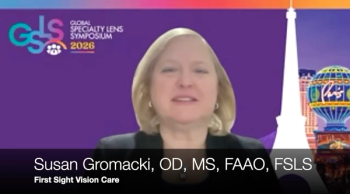
What a millennial OD can bring to your practice
Everybody’s talking about millennials. They’re self-obsessed and entitled. They’re useless without their smartphones and social media. They’re debt-laden and broke. They’re lazy. They often have roommates, and they call them “Mom” and “Dad.” Wow, millennials are the worst. So-are you ready to hire one?
Everybody’s talking about millennials.
They’re
Wow, millennials are the worst. So-are you ready to hire one?
There’s a good chance that you’ll be working with millennials in your practice soon, if you aren’t already. If you’re considering taking on an associate OD, this generation offers some interesting challenges and opportunities, just like every generation before it.
More practice management:
Bad reputation
Millennials got a pretty bad reputation in their coming-of-age years. But do they actually live up to those stereotypes?
“There’s a generalized perception that millennials want more than they deserve, that they don’t want to work for it, that they don’t want to put in the time and effort to get where they need to go, that they want things kind of laid out,” says Optometry Times Editorial Advisory Board member David Kading, OD, FAAO, co-founder of
Dr. Kading and Optometric Insights co-founder and Optometry Times Editorial Advisory Board member Mile Brujic, OD, FAAO-who maintains he, too, is a millennial-work with students and young optometrists
“There’s a perception from established doctors that millennials aren’t ready to work,” says Dr. Brujic. “I don’t know if there could be a more false statement. Some of the best workers in my mind and the ones who don’t take things for granted are the millennials.”
He says that the millennial generation tends to work differently from other generations, but that doesn’t mean millennials don’t work hard. In fact, says Dr. Brujic, he finds that millennials tend to work smarter because they’re prepared for the digital world.
To a certain extent, some of these negative perceptions may be based on the way this generation grew up, Dr. Kading says. Many members of this generation may not have had to work as hard as previous generations. But that doesn’t mean they aren’t willing to work.
“They still worked hard to get through optometry school,” says Dr. Kading. “There’s still a lot of hope that we’re going to have some great doctors out there. A lot of them are really, really eager to put their noses to the grindstone. We just have to get out there and find them.”
Through his work, Dr. Kading says he’s found the millennial generation to be energetic, full of excitement, eager to learn, and anticipating the future.
More practice management:
“I think that there are certainly challenges. The biggest part is the differences in generations and the way we see the world,” says Dr. Kading. “Not that any one way is wrong-we’re groomed from our experiences. It’s not a generation’s fault for thinking the way they think, whether it’s a millennial, Generation X, or Generation Y."
In addition to being a millennial himself, Matt Geller, OD, is the founder of
“This isn’t just people desiring to behave a certain way-we’re ‘addicted to technology’ because that’s where social interactions happen,” he says. “Lazy is a misnomer, I think, because we are used to automation, and we’re used to being able to get things quickly, and when when a slower way comes along, we say ‘wait a second, there is a much better, faster and more efficient way to do this.’ So it’s not necessarily laziness-it’s just having a different set of expectations.
“I think the paradigm or the framing of it all is wrong-we’re labeled as lazy, addicted to technology, need instant gratification, when in fact what it is that the people who are judging us don’t understand our generation. They’re not looking at it from our eyes,” he says.
What a young OD brings to the table
Now that we’ve established that millennials maybe aren’t so bad after all, it’s time to consider what a young optometrist could bring to your practice. Bringing in someone with a different set of experiences and specialties can help grow your practice.
“It’s probably one of the best investment opportunities,” says Dr. Geller. It’s incredible what a millennial OD who’s motivated can bring to the practice.”
Dr. Geller says that millennial optometrists tend to be more ocular disease focused than previous generations.
“Most millennials are being employed by docs who have always focused on optical and boutique and really focused on eyewear-and some of these docs aren’t even glaucoma certified,” he says. “That creates an interesting dynamic because it enables a practice to have a new modality of care. The millennial will often bring in ocular disease and nutraceutical therapies while the senior doctor can focus more on the optical or modalities like specialty contact lenses."
More practice management:
Of course, these young doctors are often well-versed in the latest technology and offer suggestions for improvements on the tech side of the business.
“When you’ve got someone who’s grown up around technology, she can contribute an enormous amount to existing systems but also set up new systems,” he says.
In his experience, Dr. Geller says that younger ODs are looking for an office with structure, but they’re often finding practices that are run like the Wild West.
“In our millennial generation, we’re used to things being run by more regulations, more rules, and more rubrics, so I think millennials are often lost when they go into an office and there doesn’t seem to be structure-that’s a very common thing,” he says.
One disadvantage for millennial ODs? They tend to lack business experience. With a heavy ocular disease focus in school, young optometrists often come out of school a little bit lost when it comes to the business side of a practice.
Looking for millennials
For doctors looking to hire millennials, Dr. Kading recommends contacting the nearest optometry school or getting involved with student programs at some of the national optometry meetings, like such as American Optometric Association Optometry’s Meeting, American Academy of Optometry, or Vision Expo East and Vision Expo West.
He also suggests a job-matching service, like such as
Related:
CovalentCareers was co-founded in part Dr. Geller and Ryan Corte, OD, and is eye care’s first online job-matching platform. It uses a matchmaking algorithm that analyzes data from both the employer and the prospective employee. The algorithm uses basic information such as location and position type along with more specific information such as personality, corporate culture, and specialty experience to find the right match for both parties.
“Locating a good position is difficult-job boards are very fleeting. The listing goes up, and it’s gone,” says Dr. Geller. “So with CovalentCareers, we try to give your job search a home.”
Dr. Geller says that among the doctors searching for a job on CovalentCareers, more than half are millennials-27 percent are looking for their first job out of school, 20 percent have one to five years of experience, and four percent have six to 10 years of experience.
Advice for millennials
If you’re a young OD trying to find your place on the job market, every doctor we spoke with had the same advice: start early.
“The wrong time to start looking for a job is the moment you get off the graduation stage,” says Dr. Kading.
Part of Drs. Kading and Brujic’s mission with Optometric Insights is to get students thinking about their future sooner. Dr. Kading says before they graduate, students need to get involved in the communities where they want to work. He recommends getting involved with the state association, working on state legislation, and visiting local doctors.
“Millennials tend to be very free spirits, and they’re fine with going anywhere in the world where there’s a job. Unfortunately, the jobs may not be where they want to be long term,” he says. “This way, when they graduate, they already have people in that camp who can help them. It may not happen right away, but it’s good to start putting down a foundation.”
Dr. Geller says there is a lot of talk about an oversupply of optometrists-but based on his experience with CovalentCareers, he believes it has more to do with an uneven distribution.
• Austin, TX
• Salt Lake City
• San Diego
• Los Angeles
• Denver
• Washington, DC
• Houston
• Las Vegas
• San Francisco
• Dallas-Fort Worth
But ODs are most needed in smaller towns and rural areas, says Dr. Geller.
“We know that there are many employers who cannot find ODs for their practice, this is heard through the grapevine but was made evident by studies like
When seeking out and applying for a job, Dr. Brujic says millennials should figure out in what kind of practice they see themselves and search out practices with the same mission. If you want to be ocular disease focused, applying for a position at a refractive-focused practice won’t work out for either party.
When Dr. Geller was interviewing for his first job, he created a business plan to pitch to his prospective employer. (Check out how he did it
“When I first went into practice, I knew the doctor took things very seriously, and he wants the best. I totally appreciate that. So, I knew that going in, and I made this hybrid business plan that explained what I could bring to his practice,” he says. “And over the next two years, that’s what I helped deliver on.”
The business plan was a great way for Dr. Geller to express his value to his prospective employer. It set him apart from the competition, and he credits the plan with landing him his first job.
Before you interview, Dr. Geller recommends practicing your standard interview questions and listening to you’re responses as if you were the employer-be critical. What kind of value could you bring to the practice?
“Set up your phone and record yourself. “It’s painful-but it will enhance your interview skills,” he says.
And when it’s time for the interview, Dr. Brujic says millennial ODs need to keep an open mind when it comes to the established doctor.
“They should respect the opinion of the established optometrist who they’re speaking with and not necessarily prejudge them because of age, year of graduation, male or female, or even the type of practice they’re in,” he says. “I would be very open minded because I think when start prejudging before we meet and start communicating with somebody is when we get into trouble.”
Newsletter
Want more insights like this? Subscribe to Optometry Times and get clinical pearls and practice tips delivered straight to your inbox.















































